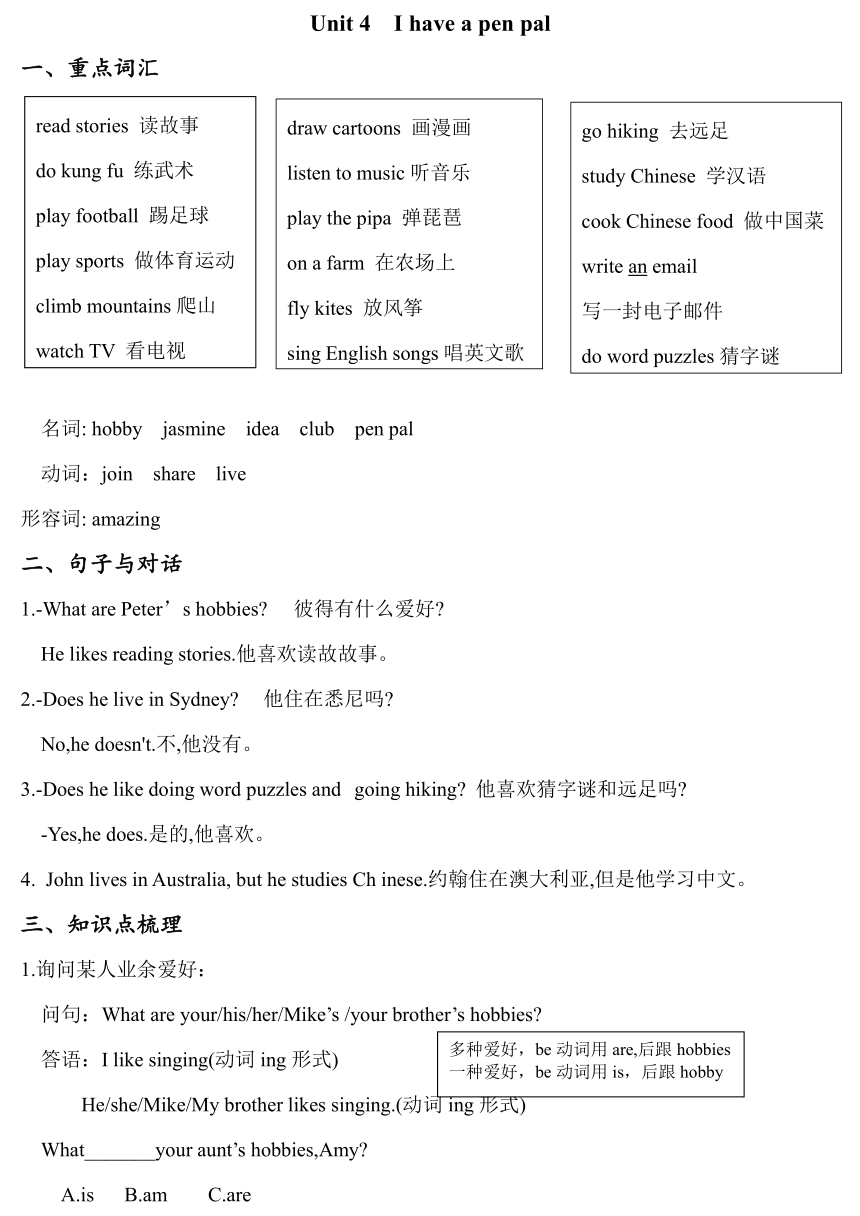Unit 4 I have a pen pal (讲义)(无答案)
文档属性
| 名称 | Unit 4 I have a pen pal (讲义)(无答案) |

|
|
| 格式 | docx | ||
| 文件大小 | 19.3KB | ||
| 资源类型 | 教案 | ||
| 版本资源 | 人教版(PEP) | ||
| 科目 | 英语 | ||
| 更新时间 | 2024-01-19 09:03:16 | ||
图片预览

文档简介
Unit 4 I have a pen pal
一、重点词汇
(
go hiking
去远足
study Chinese
学汉语
cook Chinese food
做中国菜
write
an
email
写一封电子邮件
do word puzzles
猜字谜
) (
draw cartoons
画漫画
listen to music
听音乐
play the pipa
弹琵琶
on a farm
在农场上
fly kites
放风筝
sing English songs
唱英文歌
) (
read stories
读故事
do kung fu
练武术
play football
踢足球
play sports
做体育运动
climb mountains
爬山
watch TV
看电视
)
名词: hobby jasmine idea club pen pal
动词:join share live
形容词: amazing
二、句子与对话
1.-What are Peter’s hobbies 彼得有什么爱好
He likes reading stories.他喜欢读故故事。
2.-Does he live in Sydney 他住在悉尼吗
No,he doesn't.不,他没有。
3.-Does he like doing word puzzles and going hiking 他喜欢猜字谜和远足吗
-Yes,he does.是的,他喜欢。
John lives in Australia, but he studies Ch inese.约翰住在澳大利亚,但是他学习中文。
三、知识点梳理
1.询问某人业余爱好:
(
多种爱好,
be
动词用
are,
后跟
hobbies
一种爱好,
be
动词用
is
,后跟
hobby
)问句:What are your/his/her/Mike’s /your brother’s hobbies
答语:I like singing(动词ing形式)
He/she/Mike/My brother likes singing.(动词ing形式)
What_______your aunt’s hobbies,Amy
A.is B.am C.are
-What’s your hobby,Sam -_______
A.I usually play ping-pong. B.I like doing word puzzles. C.I am reading a storybook.
-Do you like __________ -Yes,I do.
A.swim B.swimming C.go swimming
2.动词若是遇到第一、二人称级人称复数,不变化。
如I/You/We/They/My grandparents/Mary and Amy live on a farm.
动词若是遇到第三人称单数(即他,她,迈克,我的姐姐,某人),要在后面加s或es(特殊情况除外)。
4.does引导的一般疑问句:
Does he/Mike/Amy’s brother /the boy(主语) like singing?
Yes,he does./No,he doesn’t. He likes dancing.
Does she/Amy/Tom’s mum /the girl(主语) like singing?
Yes,she does./No,she doesn’t. She likes dancing.
动词单三变化规则
My mother ______(go) to work on foot.
Li Ming ____(study)hard at school. He is hard-working.
He____three classes in the morning.
四、易错点
1.also与too表示“也”,都用于肯定句,
also用于句中,be 助情后,实义动词前;too一般用于末尾,通常与前面句子隔开。
I like Chinese food.I _______(also/too) like Chinese kung fu.
Mary doesn’t like onions. Her father doesn’t like them,______.
动词和介词后跟人称代词宾格。
I’m going to teach_______(he) the Chinese song“Jasmine Flower”.
3.and but
Come ____see my new pen pal.
He lives in Australia,____he studies Chinese.
want to do sth.
Do you want to learn about robots?
who做主语的时候相当于第三人称单数。
Who ______(do/does)dishes
can后跟动词____
From来自
一、重点词汇
(
go hiking
去远足
study Chinese
学汉语
cook Chinese food
做中国菜
write
an
写一封电子邮件
do word puzzles
猜字谜
) (
draw cartoons
画漫画
listen to music
听音乐
play the pipa
弹琵琶
on a farm
在农场上
fly kites
放风筝
sing English songs
唱英文歌
) (
read stories
读故事
do kung fu
练武术
play football
踢足球
play sports
做体育运动
climb mountains
爬山
watch TV
看电视
)
名词: hobby jasmine idea club pen pal
动词:join share live
形容词: amazing
二、句子与对话
1.-What are Peter’s hobbies 彼得有什么爱好
He likes reading stories.他喜欢读故故事。
2.-Does he live in Sydney 他住在悉尼吗
No,he doesn't.不,他没有。
3.-Does he like doing word puzzles and going hiking 他喜欢猜字谜和远足吗
-Yes,he does.是的,他喜欢。
John lives in Australia, but he studies Ch inese.约翰住在澳大利亚,但是他学习中文。
三、知识点梳理
1.询问某人业余爱好:
(
多种爱好,
be
动词用
are,
后跟
hobbies
一种爱好,
be
动词用
is
,后跟
hobby
)问句:What are your/his/her/Mike’s /your brother’s hobbies
答语:I like singing(动词ing形式)
He/she/Mike/My brother likes singing.(动词ing形式)
What_______your aunt’s hobbies,Amy
A.is B.am C.are
-What’s your hobby,Sam -_______
A.I usually play ping-pong. B.I like doing word puzzles. C.I am reading a storybook.
-Do you like __________ -Yes,I do.
A.swim B.swimming C.go swimming
2.动词若是遇到第一、二人称级人称复数,不变化。
如I/You/We/They/My grandparents/Mary and Amy live on a farm.
动词若是遇到第三人称单数(即他,她,迈克,我的姐姐,某人),要在后面加s或es(特殊情况除外)。
4.does引导的一般疑问句:
Does he/Mike/Amy’s brother /the boy(主语) like singing?
Yes,he does./No,he doesn’t. He likes dancing.
Does she/Amy/Tom’s mum /the girl(主语) like singing?
Yes,she does./No,she doesn’t. She likes dancing.
动词单三变化规则
My mother ______(go) to work on foot.
Li Ming ____(study)hard at school. He is hard-working.
He____three classes in the morning.
四、易错点
1.also与too表示“也”,都用于肯定句,
also用于句中,be 助情后,实义动词前;too一般用于末尾,通常与前面句子隔开。
I like Chinese food.I _______(also/too) like Chinese kung fu.
Mary doesn’t like onions. Her father doesn’t like them,______.
动词和介词后跟人称代词宾格。
I’m going to teach_______(he) the Chinese song“Jasmine Flower”.
3.and but
Come ____see my new pen pal.
He lives in Australia,____he studies Chinese.
want to do sth.
Do you want to learn about robots?
who做主语的时候相当于第三人称单数。
Who ______(do/does)dishes
can后跟动词____
From来自
同课章节目录
